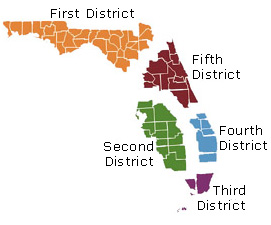In a non-precedential ruling, the U.S. Court of Appeals for the Seventh Circuit recently affirmed a district court ruling finding that telephone calls placed to a pro se consumer’s cellular telephone number did not violate the federal Telephone Consumer Protection Act (TCPA) because the calls were placed manually, and not using an automatic telephone dialing system (ATDS). In so ruling, the Seventh Circuit focused on the company representative’s declaration and the company’s call log establishing that the calls were initiated by a live representative, who made the calls by entering all numbers by hand. A copy of the opinion in Wayne…
Florida’s Third District Court of Appeal recently reversed a trial court’s mortgage foreclosure judgment against non-signatory co-owners, holding that ratification did not apply where the non-signatory owners received no benefit from the loan proceeds and did not authorize an attorney-in-fact to sign the mortgage on their behalf. In so ruling, the Appellate Court rejected the mortgagee’s efforts to impose an equitable lien on the collateral property. A copy of the opinion in Wells Fargo Bank, N.A. v. Clavero, et al. is available at: Link to Opinion. In October 2005, a mother and father, who had purchased their home more than 30 years…
The U.S. Court of Appeals for the Fifth Circuit recently rejected common law fraud and fraudulent inducement allegations brought by two borrowers arising from their default on a mortgage loan. In so ruling, the Fifth Circuit affirmed the district court’s order granting summary judgment in the mortgagees’ favor due to insufficient evidence of damages, and held that alleged misrepresentations in the course of loan modification efforts did not increase the arrearages as the arrearages would otherwise have been due under the terms of the mortgage loan. A copy of the opinion in Ronald Lawrence, Jr., et al v. Federal Home Loan…
The District Court of Appeal of Florida, Second District, recently affirmed the trial court’s denial of a third party record title holder’s motion to cancel a mortgage foreclosure sale, even though the third party movant acquired title in a prior homeowners association lien foreclosure action, and even though the third party movant alleged that the mortgagee thwarted its redemption rights by supposedly failing to provide an estoppel letter. A copy of the opinion in Whitburn, LLC v. Wells Fargo Bank, N.A. is available at: Link to Opinion. In December 2012, a mortgagee filed a foreclosure action along with a lis pendens against…
The County Court of the 13th Judicial Circuit in and for Hillsborough County, Florida, recently struck a mortgagee’s and servicer’s offer of judgment in an action under the Florida Consumer Collection Practices Act, holding in a matter it deemed of great public importance that the FCCPA preempts Florida’s Offer of Judgment statute. A copy of the order in Hall, Harold v. Deutsche Bank National Trust Company is available here: Link to Order. In May 2013, a borrower filed a one-count complaint against defendants, a mortgagee and its loan servicer, alleging a violation of the FCCPA. The defendants filed an offer of judgment pursuant…
The U.S. Court of Appeals for the Eighth Circuit recently affirmed summary judgment against the seller and originator of mortgage loans and in favor of the purchaser because the originator breached the purchase and sale agreement by refusing to cure or repurchase eight of the 11 loans. A copy of the opinion in CitiMortgage, Inc. v. Chicago Bancorp, Inc. is available at: Link to Opinion. The plaintiff mortgage loan investor purchased mortgage loans originated by the defendant lender in 2004. The plaintiff’s business involved re-selling most of its loans to other investors in the secondary mortgage market. The purchase and sale agreement required the…
The U.S. Bankruptcy Court for the Middle District of Florida recently held that: 1) A bankruptcy trustee was entitled to recover $1,000 in statutory damages on behalf of each of the husband and wife debtors against a loan servicer for violating the Florida Consumer Collection Practices Act (FCCPA) by contacting the debtors after they were represented by counsel; and 2) The servicer could not set off the $2,000 in FCCPA damages against the balance owed on the mortgage loan because, according to the Court, allowing a set off would thwart the FCCPA’s goal of deterring abusive debt collection practices; and…
The U.S. Court of Appeals for the First Circuit recently held that a genuine dispute of material fact precluded summary judgment on the issue of whether the sale of collateral was “commercially reasonable,” even though there was no evidence that the sale was not “fairly conducted.” A copy of the opinion in Harley-Davidson Credit Corp. v. Galvin is available at: Link to Opinion. The assignee of a loan secured by an interest in an aircraft sued the guarantor of the loan to collect $108,681.50, the deficiency that remained after the assignee sold the collateral through a third-party dealer. Pursuant to the loan…
The United States District Court for the Western District of Missouri recently granted a debt collector’s motion for judgment on the pleadings, holding an internal account number displayed on the envelope of a demand letter did not violate the Fair Debt Collection Practices Act (FDCPA) because it did not reveal the plaintiff was a debtor. A copy of the opinion in McShann v. Northland Group, Inc. is available at: Link to Opinion. In March 2014, the debt collector sent a demand letter regarding a consumer debt owed by the plaintiff. The letter’s envelope had a window in which the plaintiff’s name,…
The U.S. Court of Appeals for the Eleventh Circuit recently struck down Florida’s “anti-surcharge” statute, Fla. Stat. § 501.0117, holding that the Florida law prohibiting charging a fee to pay by credit card was an unconstitutional restriction of free speech. A copy of the opinion in Dana’s Railroad Supply, et al v. Attorney General, State of Florida is available at: Link to Opinion. Four small businesses filed suit after receiving cease-and-desist letters from the Florida Attorney General demanding they refrain from charging lower prices for customers using cash and higher prices for those using credit cards, and demanding that they refrain from…
In a case addressing what it means to “surrender” property under the Bankruptcy Code, the U.S. District Court for the Southern District of Florida recently held that a Chapter 7 trustee’s abandonment of real property only restores legal title to the debtors as if no bankruptcy petition had been filed, and does not also give the debtors the right to contest the mortgagee’s foreclosure if the debtors elected to surrender the property. A copy of the opinion in Failla v. Citibank, NA is available at: Link to Opinion. Husband and wife debtors defaulted on their mortgage and the mortgagee sued to foreclose.…
A credit reporting agency has settled a long-pending class action lawsuit in the U.S. District Court for the Eastern District of Virginia, agreeing to pay more than $3 million and remove from its consumer credit reports judgments entered in Virginia General District Court. The Fair Credit Reporting Act (FCRA) class action, Soutter v. Equifax Information Services LLC, was given the green light in April, with U.S. District Judge Robert E. Payne agreeing the standards for class certification had been met. In the class claim, plaintiff Donna K. Soutter contended Equifax willfully violated the FCRA when it failed to take reasonable…












